English adults are mostly supportive of new curriculum requirements including content on LGBT families, as well as lesbian, gay, and bisexual relationships and gender identity
Schools have finally reopened following the summer holidays. However, the COVID-19 pandemic has meant changes to the school curriculum planned for the new school year have been delayed until 2021. Under the revised plans, primary schools will need to include Relationship Education, and secondary schools will have new Relationships and Sex Education lessons in the summer 2021 term.
The planned Relationship Education (RE) for primary schools will not include any sexual education, but will look at the fundamental building blocks and characteristics of positive relationships, including friendships and discussion about LGBT families.
For secondary school students, the Relationships and Sex Education (RSE) will also cover healthy relationships, but look at different types of committed relationships as well as marriage. RSE will expand on what is covered in RE to include content on healthy intimate relationships, contraception, and sexual health, but will not encourage early sexual experimentation. RSE will also cover human sexuality and the law around gender identity, encouraging students to be respectful of themselves and others.
The new RE and RSE lessons were set to be compulsory for all primary and secondary schools respectively across reopening in England this month, however only 20% of English adults overall and 25% of English parents were aware of the changes.
Do English adults support the introduction of new RE content into the English curriculum?
Firstly, looking at the RE content for primary schools, English adults are on the on whole in favour of the new lessons, with 55% of adults either strongly or slightly supportive of their introduction into the English curriculum. Three in ten (32%) of English adults are opposed, however - with 18% strongly opposed to RE education in primary schools.
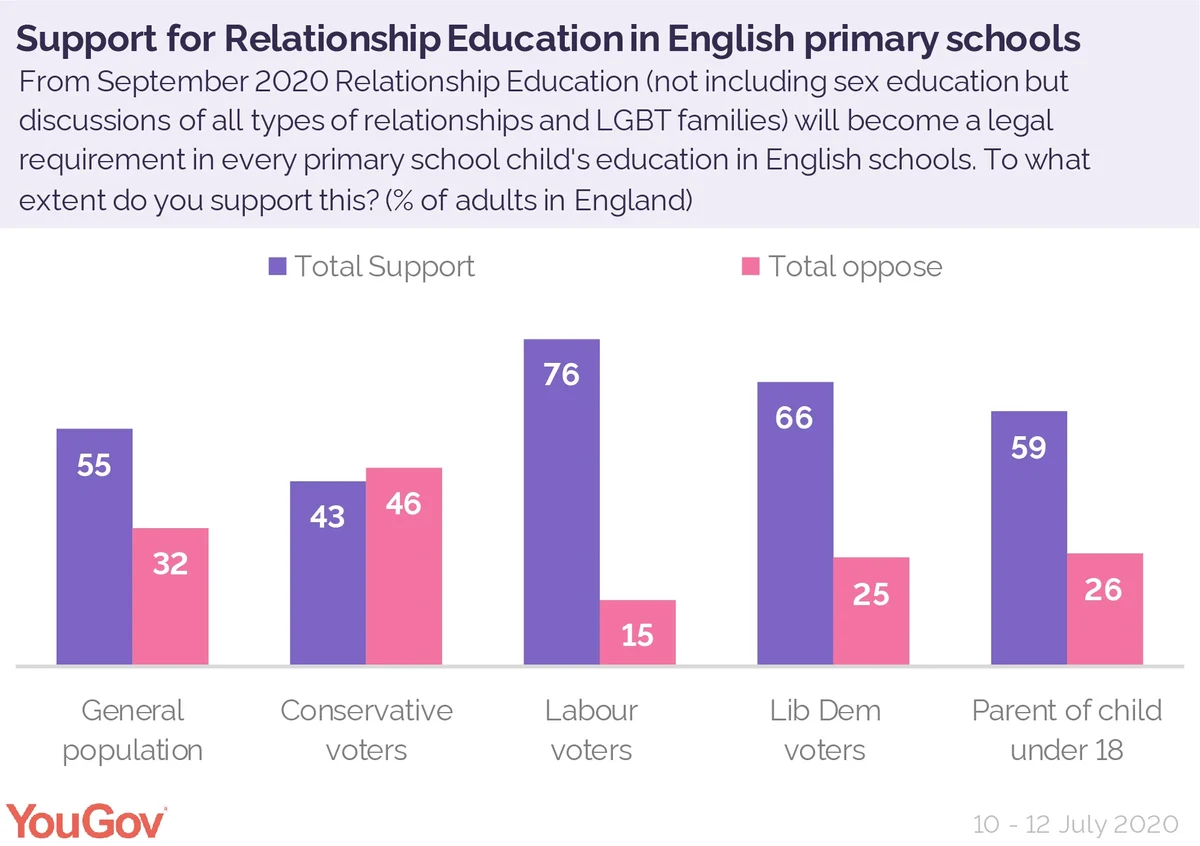
Among English parents with children under the age of 18, opinion is aligned to that of the general public, with a third (33%) strongly supporting the introduction of RE into the primary curriculum, and 26% slightly supportive. This gives a total of 59% of parents in favour, compared to 26% who are opposed to some degree.
Total support for offering English primary level students RE education rises to 76% among English Labour voters, with 50% strongly supportive of the idea. Opposition is highest among Conservative voters, who are split 43% to 46% supporting and opposing the introduction respectively.
Do adults in England support the introduction of new RSE content into the English curriculum?
Levels of support for the more in-depth RSE lessons on relationships and sex due to be taught in secondary schools, is slightly higher across the board. Six in ten (61%) English adults in general support its introduction for English schools, with around a quarter (26%) opposed.
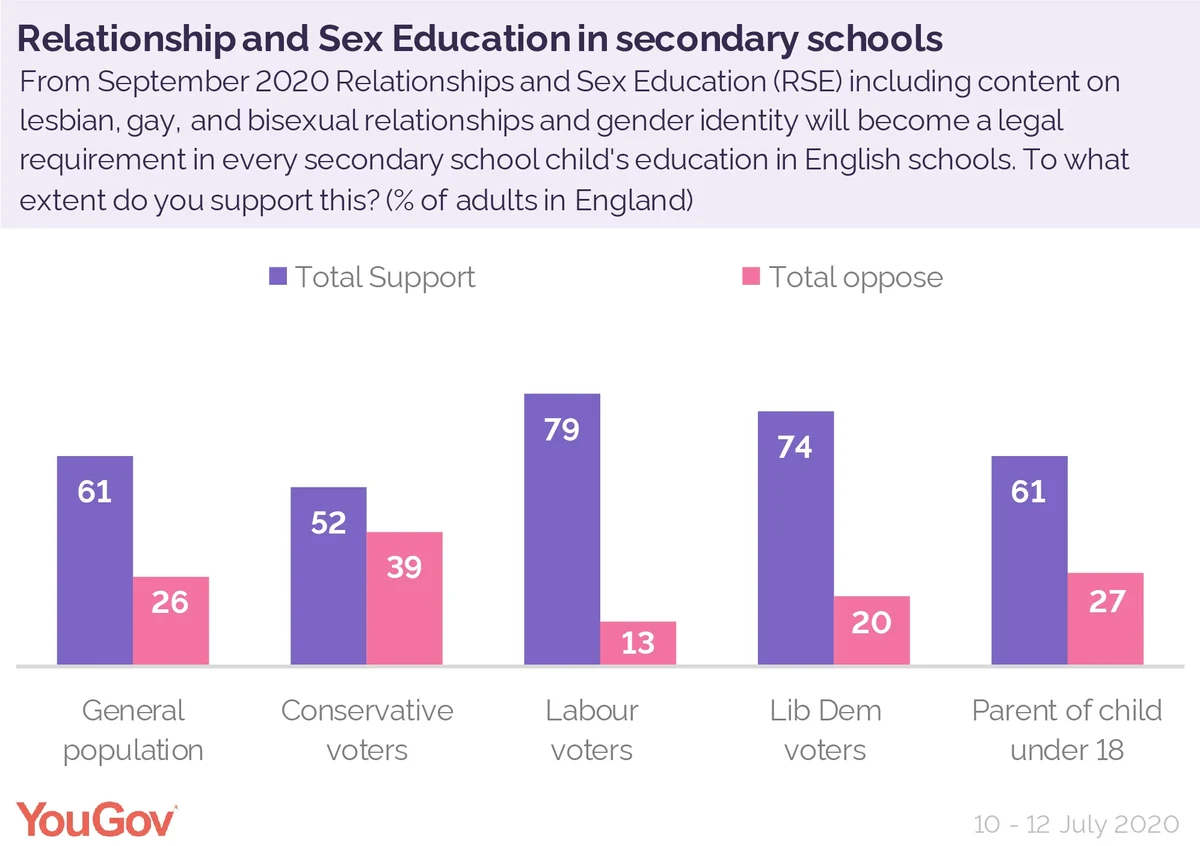
Once again, the opinion of parents is similar to that of the general population: 36% are strongly supportive of the new RSE content, and another 25% are slightly supportive, meaning overall six in ten (61%) parents are in favour versus the 27% of English parents who are opposed.
Breaking the data down by vote, those who voted Labour at the last general election are the most likely to back the introduction of RSE for English secondary schools, with 79% supportive. While Conservative voters remain the most opposed, they are more supportive of RSE than RE, with 52% supporting the introducing of RSE and 439% opposed.
In the case of both RE and RSE content women are much more likely to support the introduction of the new lessons into the curriculum. Six in ten (61%) of women support the new RE lessons for primary schools compared to less than half (48%) of men.
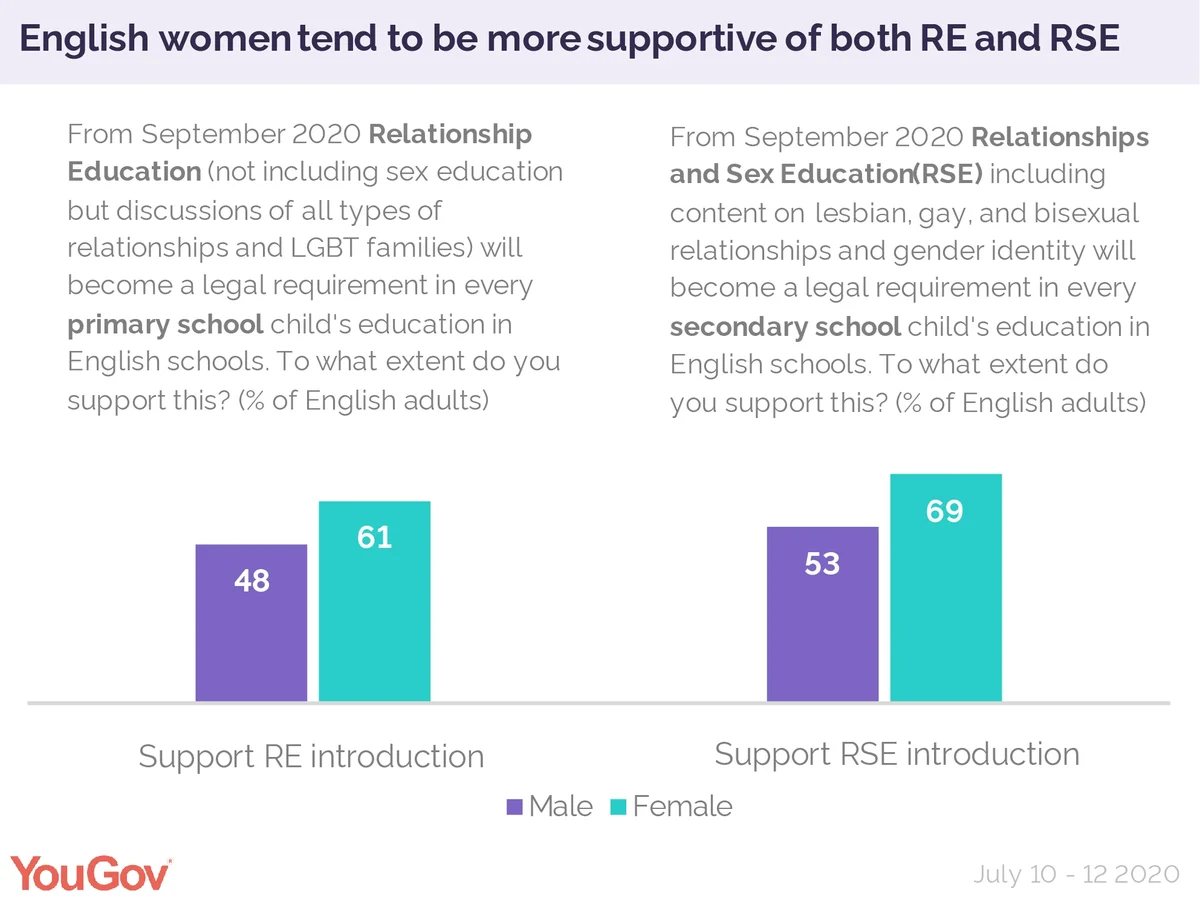
For the secondary school RSE content, more than half (53%) of men support the new material, but women (69%) are still much more likely to be supportive of the lesson plans.
What age should RSE begin?
Most English parents, as well as English adults in general, think that RSE lessons including content on LGBT relationships and gender identity should begin between the ages of 11 and 13 (which is around the time when most children will be joining secondary school).
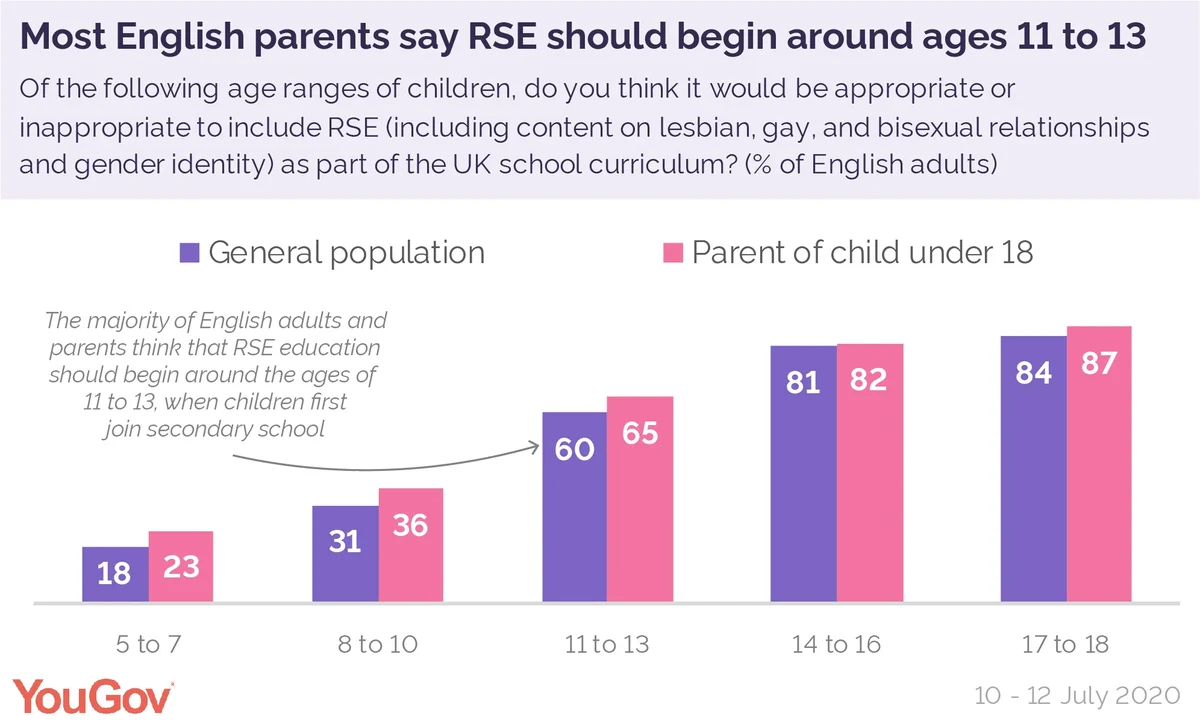
A sizeable proportion of parents think that RSE lessons should start much earlier than this however. Over a third (36%) of parents say that RSE should start between the ages of 8 and 10, while another 23% think that RSE should begin from ages 5 to 7.
Among labour voters, who are consistently more likely to be supportive of RSE, approaching half (48%) think it should begin before secondary education, at ages 8 to 10 – only 20% of Conservatives say the same.
Another three in ten of English Labour voters (31%) say it would be appropriate to start RSE at the age of between 5 and 7, where only one in ten (10%) of Conservative voters are in agreement.
Should parents be allowed to decide what parts of RSE their child takes part in?
Last year, some parents took to protesting outside schools in the UK that were teaching classes on sexual education, but with these new RSE classes being compulsory, should parents be allowed the right to withdraw their children from the classes?
Under current laws, parents have the right to withdraw their child from any or all aspects of Sex and Relationships Education that are not included within the statutory National Curriculum. However, because RE and RSE are being brought into the curriculum from September 2020, this means the law will change. From September, parents will only be able to request their children be withdrawn from some aspects of sexual education involved in RSE. Parents will not have the right to withdraw their children from relationship lessons, so they cannot withdraw their children from RE in primary school or the relationships element of RSE.
The English population is split on whether parents should have the right to withdraw their children from RSE lessons in secondary schools, with 41% in favour of giving parents the right, and 42%saying parents should not be able to withdraw their children from the lessons.
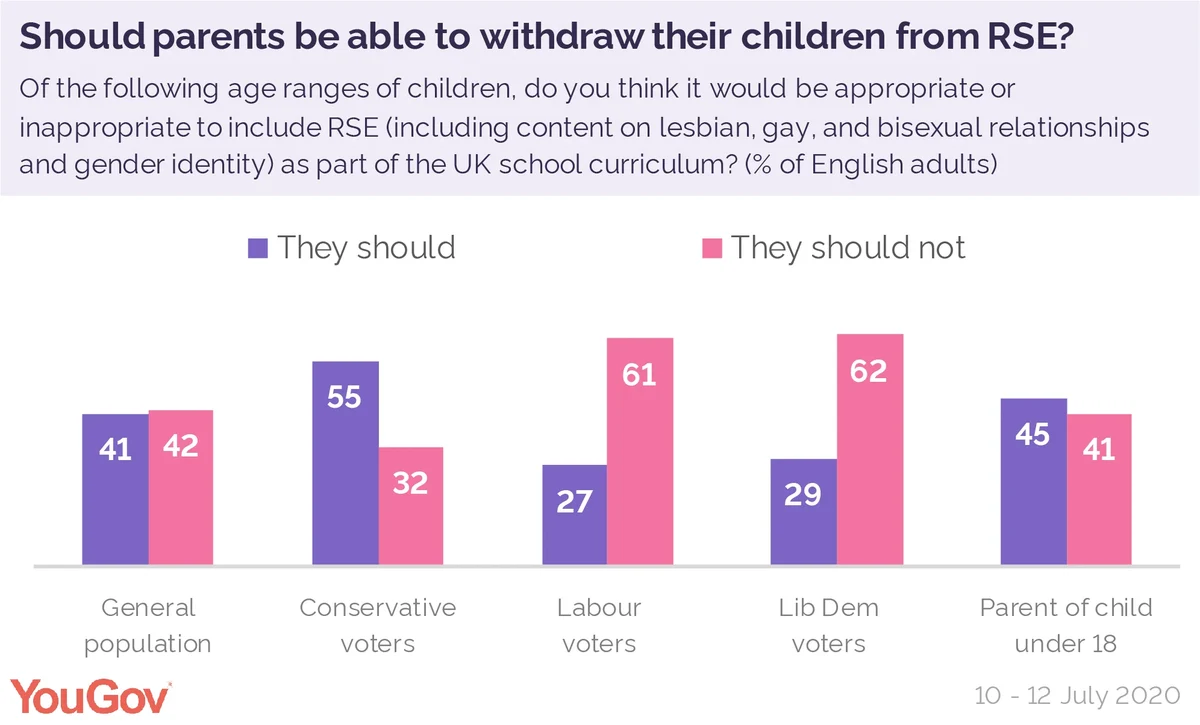
Among parents themselves however, despite being mostly in favour of both RE and RSE being introduced, there is a split, with 45% for and 41% against being allowed the right of withdraw.
Labour voters are the most likely to say that parents should not have a say in whether their child takes part in RSE lessons at school, at 61% who oppose the right to withdraw. The majority of Conservative voters think the opposite, with 55% in favour of allowing parents to withdraw their children.











